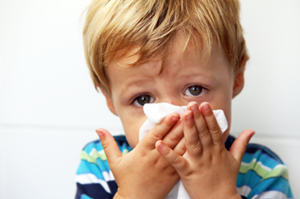
Allergies
|
When Tiff Thojoya takes her 7 year old daughter camping she also brings about half of her possessions.
Tiff’s daughter Elisha suffers from the allergenic reaction known as Anaphylaxis. Anaphylaxis is the most severe form of an allergic reaction and is potentially life-threatening. It affects the immune system, as does all allergic reactions, and needs to be treated as a medical emergency as it often involves a persons’ throat and tongue swelling up.
Elisha’s condition is not uncommon. In the Western world, 1 in 20 children suffer from an allergy, with the number growing every year. Due to her daughter’s condition she has started a business called Kids Alert which makes medical alert wristbands specifically designed for kids so they can be instantly identified when out and about.
When Tiff goes camping with her daughter the first thing that is on her mind is her daughter’s safety. Throughout her experience she has learned a few tricks to make the experience more pleasurable for herself and her child and has shared them with us:
- Identify potential hazards and talk to your child about them
Just because your child is prone to allergies doesn’t mean they have to miss out on all of the fun. Nor do you. You can save yourself time and stress by having a conversation with them before you go camping with your child. Talk to them about the things they must avoid while camping, such as food from other campers, and explain why.
- Create a contingency plan
Children are fickle. Just because you have a conversation with them about what they should avoid doesn’t necessarily mean they will. Because of this, it’s important to create a contingency plan. Before heading out for your camping trip be sure to find out where are the closest medical facilities and hospitals.
- Bring backup medication
Take all medication, including
- Epipens
- Antihistamines
- Inhaler for asthma attacks
- Make sure your child has an Alert Wristband if they suffer from special allergies
If your child suffers from special allergies, such as anaphylaxis, it’s important that others are made aware. One of the easiest ways to notify others of your child’s allergies is by getting them an Alert Wristband. The wristbands are specifically designed for kids so that they can be identified no matter where they venture. Kids Alert specializes in such wristbands and can be easily purchased online.
- Avoiding common hazards
Your child may not suffer from severe allergies, but there are still some common outdoor hazards that can put a damper on your trip. So here are some of our own suggestions on how to reduce the chance of these happening:
- Protect against insect Bites
Insect bites can result in a variety of reactions from mild irritation to vomiting or worse. When camping you can greatly reduce the chance of you or child getting bitten in the first place with a few simple adjustments.
- Dress in clothing that covers exposed skin.
- Avoid areas with lots of weeds and blooming plants that attract bees and wasps.
- Set up your campsite away from hollow logs and caves where mosquitoes gather.
- Use screening, nets and enclosures.
- Try to avoid being outside during peak mosquito times (dusk), especially in areas that have high concentrations of mosquitoes, such as lakes, ponds, creeks and swampy areas.
- Use insect repellents with DEET (we know it’s not very environmentally friendly).
- Air out your tent
Mold spores can trigger allergy and asthma attacks. The easy fix is to air your tent out prior to your camping trip and clean off mold with a diluted bleach and water mixture.
To avoid mold growth in your tent you can take preventative measures by hanging your tent in the air, allowing it to dry completely as soon as you return from your camping trip.
- Keep cool to avoid Sun Rash
If your child’s skin is sensitive to exposure to the sun be sure they are covered. Wide brimmed hats, staying in the shade, and high SPF sunscreen are all effective measures in sun rash prevention.
- Avoid Pollen where possible
If you’re sleeping in an RV keep the windows closed to lower exposure to pollen. Select camp or RV sites that are far away from freshly cut grass.
Taking an allergenic child camping is challenging for parents and children alike. But with proper preparation and forethought, the experience can be made much more enjoyable for all.
Copyright ©2012 Camping Road Trip, LLC
Find campgrounds and RV parks - Smart Search Now
Read campground and RV park reviews to help you find the perfect place to stay.